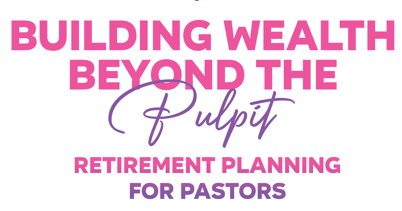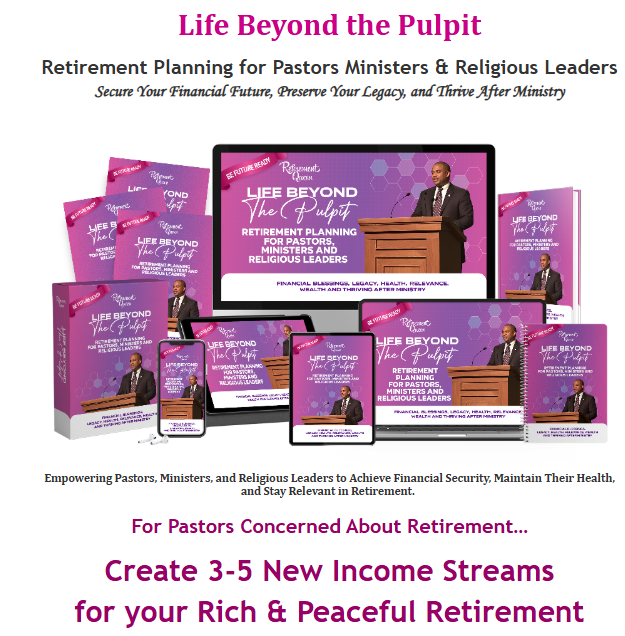The Complete Guide to Retirement Planning for Pastors:
Essential Strategies for Pastoral Retirement Security
Retirement planning for pastors presents unique challenges that traditional financial advice simply doesn't address. Unlike corporate employees with predictable salaries and employer-matched pension plans, Pastors, Clergy and ministers face housing uncertainties, fluctuating income, limited benefits, and the emotional complexity of transitioning from a life-defining calling.
Recent surveys reveal a startling reality: 68% of pastors have less than $50,000 saved for retirement, while 38% report having no retirement savings whatsoever. This retirement planning crisis among clergy members highlights the urgent need for specialized pastoral retirement strategies that address the unique financial landscape of ministry.
Whether you're a newly ordained minister starting your first pastorate or a seasoned pastor approaching your golden years, this comprehensive guide provides the essential strategies you need to build lasting pastoral retirement security. From understanding clergy-specific tax advantages to navigating the housing transition, we'll cover every aspect of successful retirement planning for pastors.
Table of Contents
- Understanding the Pastoral Retirement Challenge
- Essential Retirement Planning Strategies for Ministers
- Maximizing Clergy Tax Advantages
- Housing Security in Pastoral Retirement
- Healthcare Planning for Retired Ministers
- Creating Multiple Income Streams
- Estate Planning for Pastoral Families
- Taking Action: Your Next Steps
Understanding the Pastoral Retirement Challenge
Why Traditional Retirement Advice Fails Pastors
Most retirement planning advice assumes steady corporate employment, employer benefits, and predictable income growth. However, pastoral retirement planning must account for several unique factors that make traditional approaches inadequate for ministers.
Income Volatility and Limited Growth Potential Pastoral salaries often remain relatively flat throughout a minister's career, with limited opportunities for dramatic income increases. Many pastors change churches multiple times, potentially losing continuity in retirement benefits or having to start over with new denominational systems.
The Parsonage Problem Approximately 60% of pastors live in church-provided housing (parsonages) during their careers. While this provides immediate housing security, it means many ministers reach retirement age without having built equity in personal real estate – a cornerstone of most people’s retirement wealth.
Limited Employer Benefits Unlike corporate employees, many pastors work for small churches that cannot afford comprehensive benefit packages. This often means minimal or no employer contributions to retirement plans, limited health insurance options, and no access to employer-sponsored financial planning resources.
Emotional and Identity Challenges Ministry isn't just a job – it's a calling that often defines a pastor's entire identity. The transition to pastoral retirement can create profound emotional and spiritual challenges that must be addressed alongside financial planning concerns.
Essential Retirement Planning Strategies for Ministers
Strategy #1: Start Your Pastor Retirement Plan Early
The most powerful tool in retirement planning for pastors isn't sophisticated investment strategies or high-yield accounts – it's time. Ministers who begin systematic saving in their twenties and thirties dramatically outperform those who delay until their forties or fifties.
The Power of Compound Growth for Pastors Consider Pastor Sarah, who begins saving $150 monthly at age 25 with a modest 6% annual return. By age 65, she'll have approximately $395,000. Compare this to Pastor Michael, who waits until age 40 to begin saving $300 monthly (double the amount) with the same return. Despite saving twice as much monthly, Pastor Michael will only accumulate about $263,000 by retirement.
Practical Starting Steps for Young Ministers:
- Begin with any amount you can afford – even $25-50 monthly builds the crucial habit
- Set up automatic transfers to remove the temptation to skip months
- Take advantage of any denominational retirement programs immediately
- Consider starting with a Roth IRA for tax-free growth potential
Strategy #2: Master Clergy-Specific Tax Advantages
Pastors have access to unique tax benefits that can significantly accelerate retirement savings when properly utilized. Understanding and maximizing these advantages is crucial for successful pastoral retirement planning.
The Housing Allowance Advantage The ministerial housing allowance is one of the most powerful tax benefits available to clergy. This allows pastors to exclude a portion of their income from federal income taxes when used for housing expenses – and this benefit continues into retirement for many ministers.
Retirement Account Strategies for Pastors:
- Contribute to denominational 403(b) plans when available
- Maximize IRA contributions (both traditional and Roth options)
- Consider the unique "double dipping" opportunity many pastors have with retirement accounts
- Understand how housing allowances interact with retirement distributions
Self-Employment Tax Considerations Most pastors pay self-employment tax on their ministerial income, which can be both a challenge and an opportunity. While this increases current tax liability, it also allows for additional retirement planning options like SEP-IRAs or Solo 401(k)s for pastors with side income.
Strategy #3: Solve the Housing Equation
Housing represents the single largest challenge in pastoral retirement planning. Ministers who have lived in parsonages throughout their careers must develop alternative housing strategies well before retirement age.
The Parsonage-to-Ownership Transition If you've lived in church-provided housing for most of your career, begin planning your transition to homeownership at least 10-15 years before retirement. This timeline allows you to build equity while still benefiting from your ministerial income.
Housing Strategies for Pastors:
- Purchase rental property that can provide income now and housing later
- Negotiate housing allowances instead of parsonage living when possible
- Consider purchasing a retirement home early and renting it until needed
- Explore shared housing arrangements with other retired ministers
- Investigate senior living communities with ministry-friendly environments
Geographic Considerations Many pastors retire to different locations than where they served, often moving to be closer to adult children or to areas with lower living costs. Factor these potential moves into your housing strategy, considering how different state tax laws might affect your retirement income.
Strategy #4: Create Comprehensive Healthcare Security
Healthcare costs represent one of the largest and least predictable expenses in pastoral retirement. Ministers often lack access to employer-sponsored retiree health benefits, making individual planning essential.
Understanding Medicare and Supplement Options Medicare provides basic coverage starting at age 65, but significant gaps exist that require supplemental insurance. Pastors should begin researching Medicare supplement options and long-term care insurance at least five years before retirement.
Health Savings Account Strategies If you have access to a high-deductible health plan, Health Savings Accounts (HSAs) provide triple tax advantages and can serve as powerful retirement planning tools. HSA funds can be used for any purpose after age 65 (with regular income tax on non-medical withdrawals), making them excellent supplemental retirement accounts.
Denominational Health Benefits Research whether your denomination offers retiree health insurance options. Some denominational systems provide continued coverage for retired ministers, which can be significantly more affordable than individual market plans.
Advanced Pastoral Retirement Strategies
Strategy #5: Develop Multiple Income Streams
Successful pastoral retirement rarely depends on a single income source. Diversifying your retirement income provides security and flexibility while potentially allowing for continued ministry involvement.
Ministry-Related Income Opportunities:
- Interim pastoral positions that fit your schedule and interests
- Chaplaincy work in hospitals, nursing homes, or corporate settings
- Teaching opportunities at seminaries or Christian colleges
- Writing and speaking engagements within your areas of expertise
- Consulting for churches in transition or conflict resolution
Passive Income Development:
- Rental property investments that align with your risk tolerance
- Dividend-paying investment portfolios
- Royalties from published works or intellectual property
- Business partnerships that don't require active daily involvement
Part-Time Professional Services: Many pastors have developed skills throughout their careers that translate well to consulting or part-time professional work. This might include counseling services, event planning, organizational development, or community leadership roles.
Strategy #6: Navigate Social Security Optimization
Pastors face unique Social Security considerations due to their status regarding self-employment taxes and potential exemptions from Social Security participation.
Social Security Elections for Ministers Newly ordained ministers have a limited window to elect exemption from Social Security taxes based on religious opposition to public insurance. This decision has long-term implications for retirement planning and cannot be easily reversed.
Maximizing Social Security Benefits For pastors who participate in Social Security, understanding optimization strategies can add thousands of dollars to lifetime benefits. This includes timing of benefit claims, spousal benefit strategies, and coordinating Social Security with other retirement income sources.
Alternative Strategies for Exempt Ministers Pastors who have elected Social Security exemption must replace these benefits through private savings and investments. This requires higher savings rates but also provides more control over investment choices and retirement timing.
Strategy #7: Plan for Life Transitions and Legacy
Pastoral retirement planning extends beyond financial security to encompass life purpose, family relationships, and legacy considerations.
Identity and Purpose in Retirement Begin developing interests, relationships, and activities outside your ministerial role years before retirement. This helps create a broader sense of identity and purpose that extends beyond professional calling.
Estate Planning for Pastoral Families Ensure your estate plan reflects your values and provides for your family's security. This includes updated wills, beneficiary designations, power of attorney documents, and consideration of charitable giving strategies that reflect your lifelong commitment to ministry.
Intergenerational Wealth Transfer Consider how your retirement planning decisions affect your children and grandchildren. Some pastors incorporate education funding or family business development into their retirement strategies.
Practical Implementation: Your Action Plan
Immediate Steps (Next 30 Days)
1. Assess Your Current Situation: Calculate your net worth, including all assets and debts
2. Research Denominational Benefits: Contact your denominational office to understand available retirement programs
3. Open Initial Accounts: Start with a basic IRA or denominational 403(b) if you don't have retirement accounts
4. Create Automatic Savings: Set up automatic transfers to begin building your retirement fund
Short-Term Goals (Next 6-12 Months)
1. Develop a Comprehensive Budget: Understand your current spending patterns and identify savings opportunities
2. Maximize Tax-Advantaged Accounts: Increase contributions to retirement accounts within legal limits
3. Address Insurance Gaps: Review life, disability, and health insurance coverage
4. Begin Housing Planning: If you live in a parsonage, start researching homeownership or alternative housing strategies
Long-Term Objectives (1-5 Years)
1. Diversify Investments: Build a balanced portfolio appropriate for your age and risk tolerance
2. Develop Additional Skills: Begin building expertise that could generate retirement income
3. Strengthen Family Finances: Ensure your spouse (if married) is involved in and prepared for retirement planning
4. Create Estate Plans: Develop comprehensive estate planning documents with professional assistance
Common Mistakes to Avoid in Pastoral Retirement Planning
Mistake #1: Waiting Too Long to Start
The most common and costly mistake pastors make is delaying retirement planning until their fifties or sixties. Starting early, even with small amounts, dramatically improves retirement outcomes due to compound growth.
Mistake #2: Ignoring the Housing Challenge
Many pastors assume they'll figure out housing after retirement, but this approach often leads to financial stress and limited options. Begin addressing housing needs at least 15 years before retirement.
Mistake #3: Underestimating Healthcare Costs
Healthcare expenses typically increase with age, and many pastors underestimate the costs of health insurance and medical care in retirement. Plan for healthcare costs to consume 15-20% of your retirement income.
Mistake #4: Neglecting Spousal Involvement
Retirement affects both spouses, but many pastoral couples don't adequately involve both partners in retirement planning discussions and decisions. Ensure both spouses understand and contribute to retirement planning.
Mistake #5: Over-Relying on Denominational Benefits
While denominational retirement programs can be valuable, they shouldn't be your only retirement strategy. Diversify your retirement planning across multiple account types and income sources.
Resources for Continued Learning
Professional Development
- Consider working with financial advisors who specialize in clergy finances
- Attend denominational conferences focused on financial planning
- Join online communities of pastors discussing retirement planning
- Read books specifically addressing clergy financial challenges
Ongoing Education
- Stay updated on tax law changes affecting clergy
- Understand how healthcare reforms might impact retirement planning
- Learn about investment strategies appropriate for ministers
- Develop knowledge about estate planning and legacy issues
Conclusion: Taking Control of Your Pastoral Retirement Future
Retirement planning for pastors requires intentional action, specialized knowledge, and long-term commitment. The unique challenges facing ministers – from housing uncertainties to limited employer benefits – make it essential to begin planning early and approach retirement preparation with strategies specifically designed for pastoral circumstances.
The path to pastoral retirement security isn't about achieving perfect investment returns or having the highest income. Instead, it's about consistent action, smart use of clergy-specific advantages, and comprehensive planning that addresses all aspects of your retirement needs.
Your years of faithful service to others deserve to be followed by a retirement filled with security, purpose, and peace of mind. By implementing the strategies outlined in this guide and remaining committed to your long-term financial health, you can build the foundation for a retirement that allows you to continue living out your values while enjoying the financial freedom you've earned.
Remember that retirement planning is not a destination but a journey. Regular review and adjustment of your strategies, continued learning about financial planning, and professional guidance when needed will help ensure your pastoral retirement plan remains on track to meet your goals.
The time to start or improve your retirement planning is now. Every month you delay reduces your options and increases the financial pressure on your later years. Take the first step today toward the secure, fulfilling pastoral retirement you deserve.
About the Author
Bibi Apampa of RetirementPlanningForPastors.org is a certified financial planner specializing in retirement planning for clergy and ministry professionals. With extensive experience helping pastors navigate the unique financial challenges of ministry, Bibi has assisted hundreds of ministers in creating comprehensive retirement strategies that address both financial security and life transitions.
Understanding the specific needs of pastoral families, Bibi combines deep knowledge of biblical economics, ministerial financial empowerment, business coaching, denominational benefits, and ministry-specific financial challenges to provide tailored solutions that work in the real world of pastoral ministry.
Ready to secure your pastoral retirement? Don't let another year pass without taking concrete steps toward your financial future. Contact Bibi Apampa today for a retirement planning strategy session specifically designed for ministry professionals. During this strategy session, you'll receive a personalized assessment of your current retirement readiness and a clear roadmap for achieving your retirement goals.
Schedule your consultation now:
- Website: https://retirementplanningforpastors.org
- Download Bibi's "Passive Income Strategies for Pastors" from the website
- Access exclusive resources for pastoral retirement planning
- Join hundreds of pastors who have secured their financial future
"The best time to plant a tree was 20 years ago. The second best time is now." Take action today and give your future self the gift of a secure, well-planned retirement. Visit retirementplanningforpastors.com now to begin your journey toward financial peace of mind.
Why Pastors Choose Bibi:
Global Experience: Having worked with pastors from in many countries, Bibi provides strategies that work regardless of location or denomination.
Ministry Heart: As an ordained Minister, Bibi understands the unique challenges and opportunities of ministry life.
Proven Results: Her clients have collectively maximized millions in retirement benefits and avoided costly mistakes.
Connect with Bibi:
- Website: RetirementPlanningForPastors.org / BibiApampa.info
- Free Resources: Download Bibi's "Passive Income Strategies for Pastors" from the website
- Speaking: Available for Church conferences and pastoral events
- Coaching: Limited availability for personalized retirement planning
"My mission is to ensure that no pastor reaches retirement age unprepared. Every minister deserves financial security in their golden years, and I'm here to make that happen." - Bibi Apampa The Retirement Queen
This article is for educational purposes only and should not be considered personalized financial advice. Please consult with qualified financial professionals familiar with clergy compensation and retirement planning for guidance specific to your situation.


